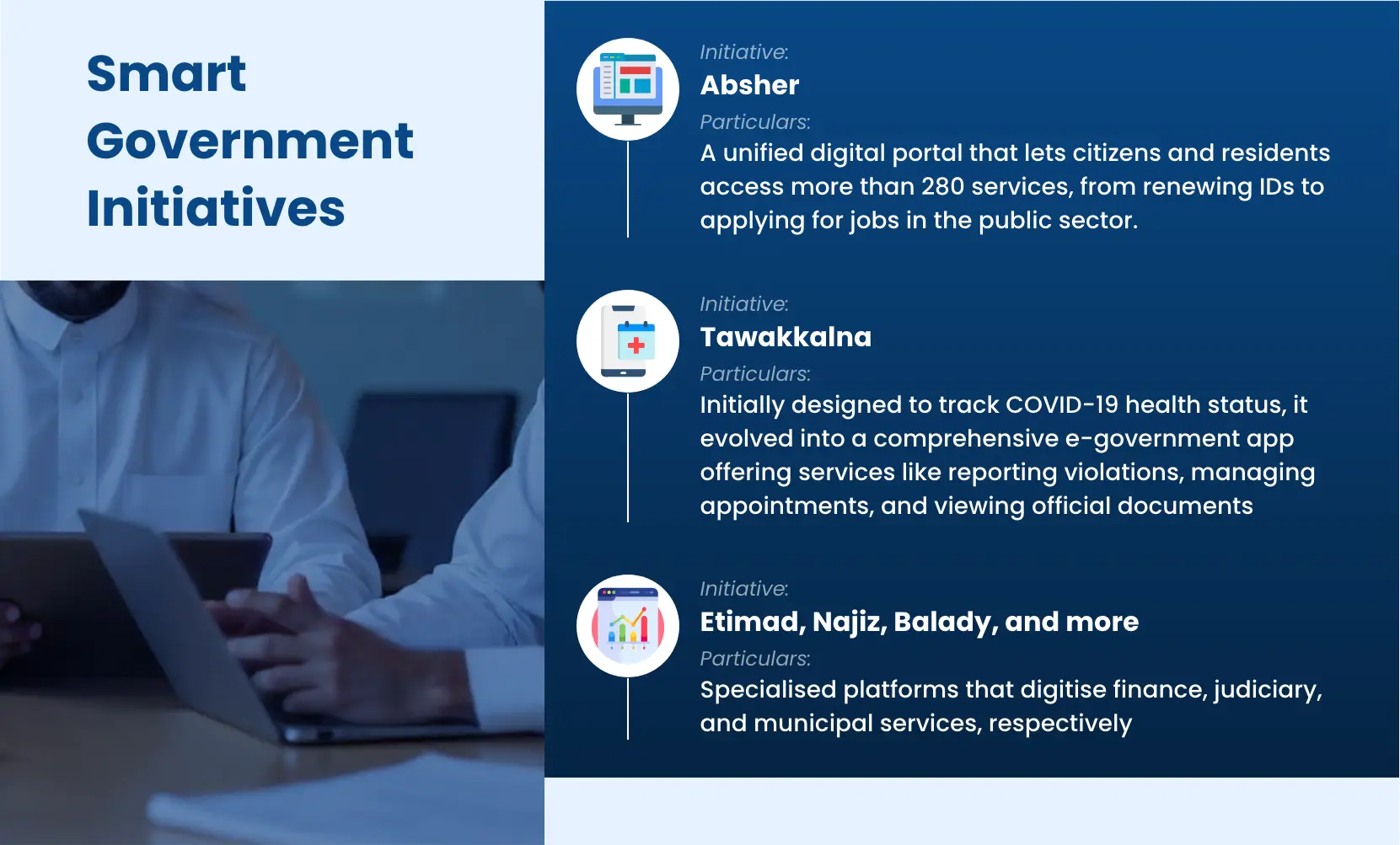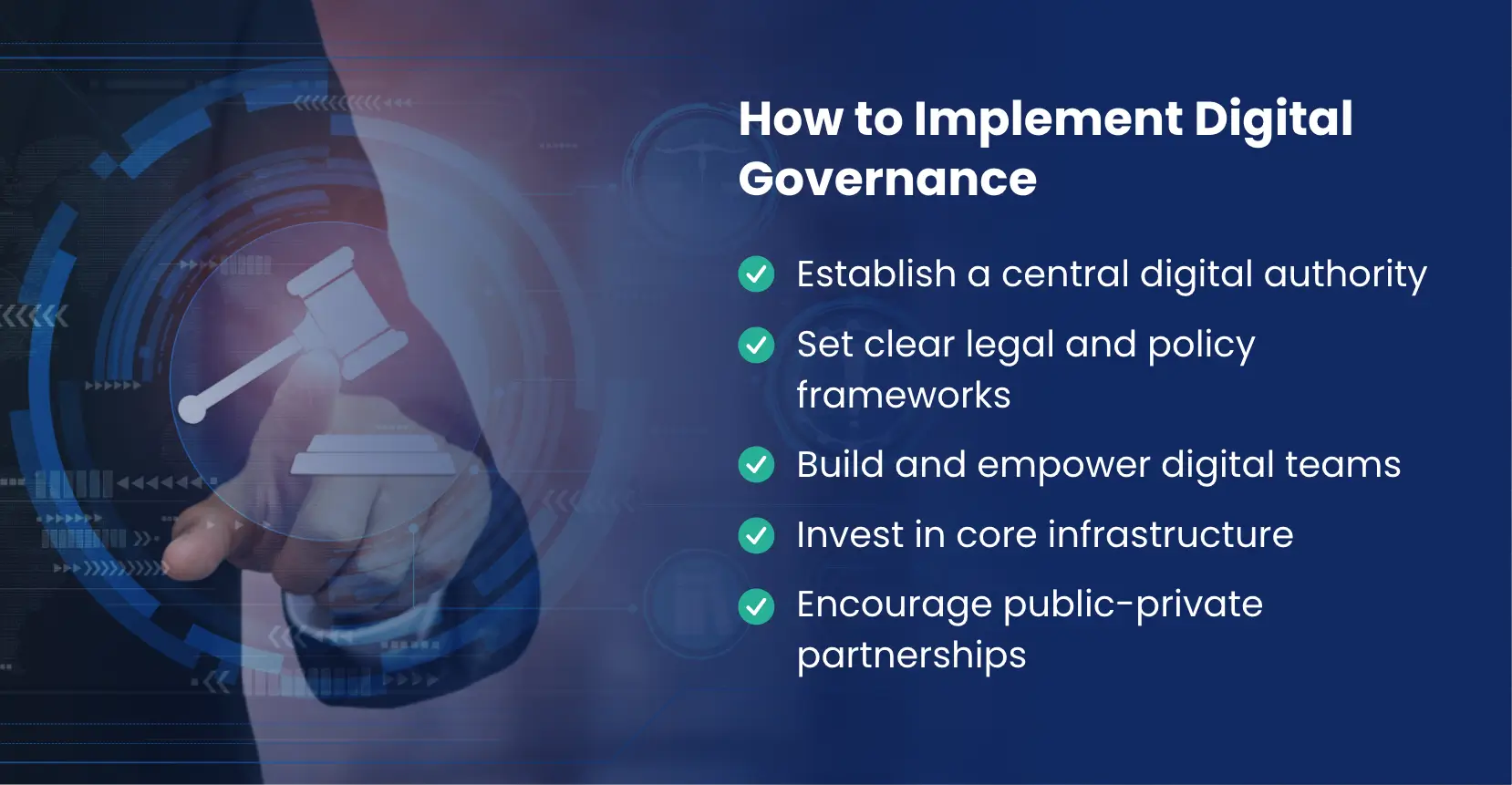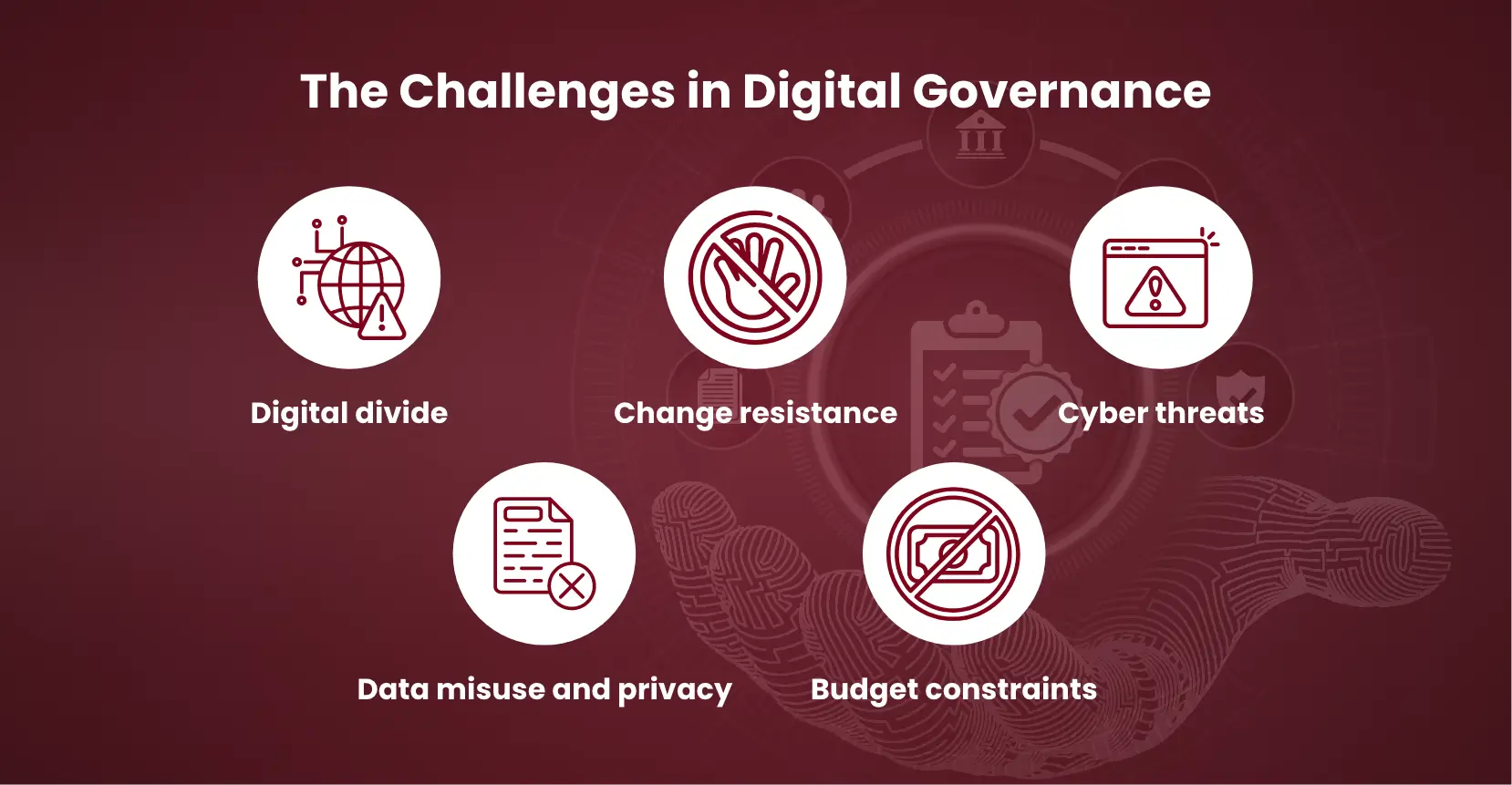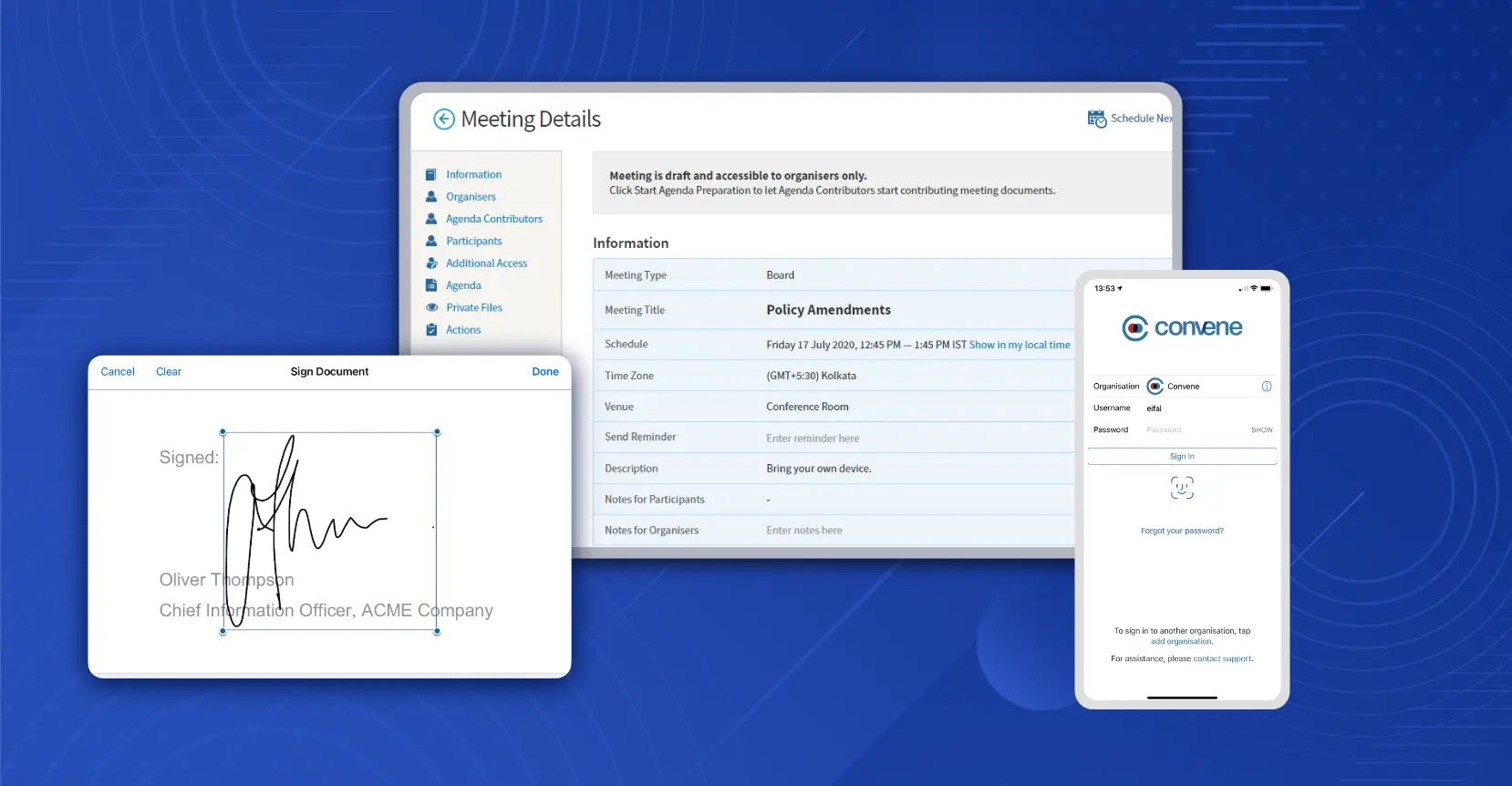We live in a time where technology is the very foundation of how governments operate, engage with citizens, and plan for the future. For Saudi Arabia, a nation boldly stepping into a digitally empowered era under the Vision 2030, the concept of digital governance is a national imperative.
What if in the near future you can renew your license with a few taps, access healthcare for your child in a few minutes, or check your municipal records in a paperless way?
That’s empowerment. That is the promise of digital governance, a promise that’s already unfolding here in the Kingdom of Saudi Arabia.
In this blog, we’ll take a look at what digital governance is, why it matters more now than ever before, and how it’s transforming lives across the nation.
What is digital governance?
Digital governance refers to how governments and organisations use digital technologies to design, deliver, and manage public services, policies, and citizen interactions.
It’s about building a digital-first nation where transparency, efficiency, security, citizen engagement, and policy alignment happen seamlessly through digital platforms. It ensures that governments don’t just adopt technology, but embed it responsibly, ethically, and strategically in every layer of governance.
Digital governance outlines:
- Who has the authority to make digital decisions
- How digital systems should be built and governed
- What ethical principles and data privacy norms must be followed
- How government institutions can collaborate digitally across sectors
The Growing Importance of Digital Governance
Here’s why digital governance matters more than ever before.
1. Citizen expectations are changing
Citizens, especially the younger generation in Saudi Arabia, now expect their interactions with the government to be as intuitive, seamless, and responsive.
The days of fragmented departments, redundant paperwork, and conflicting processes are behind us. Citizens want to renew a passport, register land, file a complaint, or access healthcare from a single, unified digital portal. They don’t want to know which ministry handles what; they just want their needs resolved quickly and clearly.
Digital governance is what makes this possible. It removes the silos that traditionally exist between government entities. It enables data sharing, so you don’t have to repeat the same process to different departments. It provides services at your convenience.
2. Complex challenges require smart solutions
We are no longer dealing with the challenges of the 20th century.
Take, for instance:
- A global pandemic that demands instant health data and rapid response mechanisms
- Cybersecurity threats that evolve daily and jeopardise national infrastructure
- Corruption and inefficiencies that hide in opaque bureaucracies
- Climate change, water management, urban planning, all requiring real-time data and adaptive systems
Traditional systems—manual, paper-based, and disconnected—simply cannot keep up. That’s why digital governance is no longer optional. It’s essential. Digital governance turns information into insight, and insight into action. It creates an environment where governance is proactive rather than reactive.
In Saudi Arabia, this is especially powerful. As we rapidly urbanise, invest in megaprojects, and expand digital infrastructure, smart governance is what will help us manage complexity at scale, with precision and foresight.
3. Economic growth is becoming digital
In the past, physical infrastructure, such as roads, ports, and industrial zones, was the primary engine of economic growth. Today, digital infrastructure, cloud computing, e-services, 5G networks, data centres, and integrated platforms fuel modern economies.
A government that operates digitally signals a message to investors: We are ready for business.
When this is taken care of, startups can launch faster when registration, licensing, tax filing, and compliance processes are online, efficient, and transparent. SMEs flourish when they have unrestricted access to government contracts and resources, free from bureaucratic obstacles or partiality.
Global investors feel more confident in economies where government systems are stable, predictable, and digitally enabled. Public-private partnerships become easier to manage, track, and scale when everyone operates on a shared digital infrastructure.
4. Enhanced means for transparency and accountability
One of the most powerful outcomes of digital governance is something deeply human: trust.
When government processes are digital, they become traceable. Every action has a timestamp. Every document has a digital footprint. Every decision leaves a trail. And that changes everything.
For citizens, this means confidence. You no longer wonder if your application got “lost.” You don’t fear that someone else might have an unfair advantage. You can log in and see where your request stands.
For public servants, this means clarity and integrity. They’re able to focus on service delivery without getting bogged down in outdated workflows. They are held accountable, but also protected by systems that record and validate their work.
For the Kingdom, it means global credibility. When international bodies see that procurement, regulation, and citizen services are transparently and digitally run, Saudi Arabia becomes a beacon of good governance in the region.
Digital Governance in Practice: The Saudi Arabia Example
Saudi Arabia’s journey into digital governance is nothing short of remarkable.
Just a decade ago, interacting with public agencies involved paperwork, long waits, and physical visits. Today, spearheaded by Vision 2030, KSA has moved towards a government that is smarter, more efficient, and more citizen-focused.
Smart Government Initiatives
Saudi Arabia has launched several flagship programs and platforms that epitomise digital governance in action.

The Role of the Digital Government Authority (DGA)
Formed in 2021, the Digital Government Authority (DGA) is the central nerve centre of Saudi Arabia’s digital transformation. It ensures that every digital initiative in the public sector is strategic, secure, and citizen-first.
Here’s what the DGA does in a nutshell:
- Regulates digital government services across ministries and agencies
- Monitors the compliance of government entities with digital standards
- Enables collaboration between sectors for shared digital platforms
- Drives innovation in areas like AI, data governance, and cybersecurity
- Elevates the digital maturity of the entire government ecosystem
DGA also sets policies that prevent fragmentation. For example, it ensures that when the Ministry of Health launches a digital app, it aligns with national data standards, works across devices, and is interoperable with other platforms like Absher or Tawakkalna.
The Main Characteristics of Digital Governance
What sets a truly digital government apart from one that simply “uses technology”? It’s about principles, structure, and a mindset shift.
Below are the core characteristics that define genuine, future-ready digital governance.
1. Citizen Centricity – Putting People At the Heart of Government
In a citizen-centric system, services are created with empathy and guided by real human journeys, whether it’s a family accessing healthcare or an entrepreneur starting a business.
Interfaces are simple, multilingual, and intuitive. Citizens don’t need to navigate layers of forms or guess which department handles what; they are guided, supported, and empowered. In Saudi Arabia, this shift is already evident in platforms like Absher, where government services once buried in paperwork are now paperless and accessible in moments.
2. Interoperability—Uniting Government as One Seamless System
Too often, government departments operate in isolation, each with its own databases, systems, and procedures. This fragmentation creates confusion for citizens and delays for everyone. Interoperability transforms this reality by allowing different government entities to securely share data, collaborate in real time, and function as a single, unified body.
In Saudi Arabia, where digital transformation is a national priority, interoperable systems mean ministries and municipalities can work together effortlessly to serve the people with speed and consistency.
3. Transparency—Illuminating the Path of Governance
Transparency is no longer limited to public reports or press briefings; it’s embedded in every transaction, every record, every decision. When a citizen applies for a license or a business files for procurement, the steps are traceable. Decisions are logged, time-stamped, and have a clear audit trail.
People feel respected when they’re not left in the dark. They feel empowered when they can hold systems accountable. In Saudi Arabia, where increasing public trust is part of the national development vision, digital transparency is fast becoming the foundation of a new, more open governance culture.
4. Security and Privacy—Trusting That Your Data Is Safe
Digital governance recognises that with increased digitisation comes increased responsibility. It is more than having strong passwords or firewalls. It’s about building security into every layer of the system, from data collection to storage to access control. Citizens need to know that their personal information, whether it’s medical history, financial records, or legal documents, is safeguarded.
Equally important is privacy. Knowing that your data will not be misused, shared without consent, or left vulnerable. Saudi Arabia’s commitment to national cybersecurity, as seen through the proactive work of the National Cybersecurity Authority, reinforces this pillar.
5. Responding with Speed and Intelligence
Crises don’t wait. Opportunities don’t linger. Digital governance empowers leaders to make informed decisions in real time by tapping into live data streams, AI insights, and predictive analytics.
Whether it’s responding to a public health emergency, redirecting traffic in a growing smart city, or flagging fraud before damage is done, real-time systems turn governance from reactive to proactive.
6. Growing with Technology, Not Fighting It
Digital governance must be agile, able to pivot quickly, adopt new tools, and evolve without breaking down. It must also be scalable, designed to handle not just today’s needs but tomorrow’s demands, whether in complexity of services or technological innovation.
Agility means adopting cloud infrastructure instead of bulky, outdated hardware. It means training civil servants to be digital thinkers and not just traditional administrators., while being open to utilise blockchain, AI, IoT, or even quantum computing when the time comes.
Saudi Arabia’s ambitious smart city projects, like NEOM and The Line, are prime examples of the need for scalable, future-ready systems.
And to support that, our governance must be just as future-forward.
How to Implement Digital Governance
While each country’s journey will differ depending on its context, culture, and capabilities, there is a shared roadmap that successful nations, like the Kingdom of Saudi Arabia, are walking with conviction and clarity.
Here’s what it looks like in practice.

1. Establish a central digital authority
Every successful digital transformation begins with a strong guiding hand, an empowered institution with the authority to lead the way. For Saudi Arabia, this role is played by the Digital Government Authority (DGA).
It sets unified digital policies, aligns fragmented efforts across ministries, ensures compliance with national goals, and drives forward the digital vision. Without such a central authority, digital initiatives risk becoming disjointed, redundant, or even conflicting. But with the DGA, Saudi Arabia has a compass that keeps the entire public sector innovating while upholding compliance and excellence.
2. Set clear legal and policy frameworks
Digitisation cannot operate in a legal vacuum. If a citizen applies for a building permit online or a startup signs a government contract digitally, there must be robust legal recognition of those transactions. This is why legal and policy frameworks must evolve alongside technology. In Saudi Arabia, digital signatures are already legally recognised, and open data laws are established for better transparency.
Cybersecurity laws must be continuously updated to protect the national infrastructure. Policies must be drafted for emerging tech like AI. Forward-looking legal frameworks give governments the confidence to digitise services, while giving citizens the assurance that their rights and data are protected.
3. Build and empower digital teams
Governments must go beyond outsourcing and instead develop their own deep digital bench.
This means training existing public servants, hiring new digital natives, and creating a public sector culture that embraces agility, experimentation, and innovation.
Empowering these teams also means giving them the tools, budgets, and autonomy they need to do their jobs well. When a government has digitally fluent teams across all departments, transformation becomes viral across the entire system.
4. Invest in core infrastructure
Digital services can only be as effective as the infrastructure that supports them. Boards and governments must invest in cloud computing, APIs, 5G networks, and secure data centers to enable efficient and secure board governance.
In Saudi Arabia, these investments are already paying off; world-class 5G networks are enabling smart city services, and cloud-first policies are driving agility across the public sector. But this infrastructure isn’t just technical; it’s strategic.
Scalable cloud platforms allow services to be launched faster and updated frequently. Robust APIs enable interoperability across ministries. Secured data centres protect sensitive national data while enabling AI and big data analytics.
5. Encourage public-private partnerships
Some of the best innovations in technology, service delivery, and design thinking come from the private sector, especially from startups and forward-thinking enterprises. Fostering public-private partnerships (PPPs) can help governments tap into this innovation engine and accelerate transformation.
These collaborations can take many forms: co-developing platforms, outsourcing tech capabilities, incubating civic tech startups, or opening up public APIs for third-party services.
Saudi Arabia has embraced this approach through programmes like the Digital Government Investment Opportunities Platform, which encourages businesses to pitch tech solutions that serve public needs. Through PPPs, governments gain speed and creativity, and businesses gain scale and impact.
The Challenges in Digital Governance
Pushing forward under Vision 2030, these challenges are critical pressure points that need to be navigated thoughtfully.

1. Digital divide
This is the gap between those who have easy access to technology and those who do not. In many countries, including parts of Saudi Arabia, access to reliable internet, smartphones, or computers is limited, resulting in large swaths of the population being left out of digital services.
Bridging this divide requires a multipronged approach: expanding affordable internet coverage, increasing device accessibility, and investing in digital literacy training. In KSA, initiatives to improve national broadband coverage and provide digital education to underserved communities are already underway, but this task remains ongoing.
2. Change resistance
Change, even when necessary and positive, can be uncomfortable, especially within large government ecosystems. Ministries and agencies are often structured around legacy systems and hierarchical processes that have existed for decades. Shifting to digital workflows requires a mindset shift.
There may be resistance from civil servants who fear job displacement, confusion around new roles, or reluctance to abandon familiar ways of working. To navigate this, governments must prioritise change management just as much as they prioritise technology procurement. This involves structured training programs, clear communication, and involving employees in co-creating new processes.
3. Cyber threats
As governments digitise sensitive services like healthcare, financial aid, and defence, they become high-value targets for cybercriminals, hacktivists, and even hostile nation-states.
The consequences of a breach in such contexts can be devastating, not just in financial terms but in eroded public trust and potential harm to national security. This means cybersecurity cannot be an afterthought or a siloed department.
It must be integrated into every layer of digital governance. Saudi Arabia has made major strides in this area with its National Cybersecurity Authority (NCA), which sets stringent standards and coordinates responses to threats.
4. Data misuse and privacy
Citizens want their services to be smart and tailored, but they also want their privacy respected. This challenge becomes even more complex with the use of AI and automated decision-making systems, which can introduce unintended biases or lack transparency in outcomes.
The solution lies in enacting clear data protection laws, establishing independent oversight mechanisms, and building citizen trust through transparency and ethical AI use. Saudi Arabia has already begun this journey with its Personal Data Protection Law (PDPL), a vital step in establishing guardrails around data usage.
5. Budget constraints
Building cloud infrastructure, integrating AI tools, revamping government websites, training teams, and protecting against cyber threats all come with significant price tags.
However, the long-term return on investment is undeniable. Digital governance reduces paperwork, lowers administrative overhead, speeds up service delivery, improves tax collection, and boosts citizen satisfaction, all of which compound over time into major cost savings and productivity gains.
How Convene Board Governance Software Supports Digital Governance in Saudi Arabia

Behind every great digital initiative is a leadership team or board of directors making complex decisions that shape national outcomes. This is where board management software like Convene becomes crucial.
If you’re wondering what digital governance software is, these portals are the silent catalysts powering faster, smarter, and more secure decision-making at the highest levels of government and enterprise.
In Saudi Arabia, boardrooms are becoming agile, data-driven, and secure digital environments. Convene facilitates this transition by offering a comprehensive platform that allows government leaders, public sector executives, and corporate board members to collaborate seamlessly, regardless of location.
With Convene, board members can receive documents in real-time using advanced board management features, annotate policies securely, vote electronically, generate automated meeting minutes, and access historical decisions, all within a fully encrypted, highly secure environment. It’s the essence of digital governance in action.
Moreover, compliance with Saudi data protection laws, such as the Personal Data Protection Law (PDPL), is non-negotiable. Convene meets stringent global and local standards of cybersecurity, offering robust access controls, encrypted communications, and local data hosting options, making it perfectly aligned with KSA’s security priorities.
As the Kingdom continues to stride boldly into a tech-powered future, board portals like Convene will remain at the core, quietly but powerfully steering the ship from within.
Contact our product team for a demo today to see how Convene can simplify everyday board management.
Nina is a Digital Marketing Manager of the global marketing team at Convene. She has profound knowledge of the growing trends within the board management software market. With her ample experience in marketing and corporate solutions, she authors in-depth articles that teach companies about the features and benefits of board portals.










